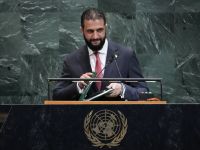US President Bill Clinton kept up a furious shuttle between Israeli and Palestinian leaders in Sharm el-Sheikh Monday, in a last-ditch effort to bring an end to spiraling violence and salvage the Middle East peace process.
Clinton finished up a third bilateral meeting with Israeli Prime Minister Ehud Barak and was holding informal talks with his team, White House spokesman P.J. Crowley said.
That session followed two bilaterals with Palestinian leader Yasser Arafat, he said.
"This is a work in progress," Crowley told reporters. "Now we're into the meat of the issue. We came here to work on some practical steps to disengage and help stop the violence and I think we can judge that we're into the meat."
He declined to comment on the substance of the flurry of meetings.
Clinton's meetings followed a somber address at the opening of the emergency peace summit at the Egyptian Red Sea resort in which he pleaded with Barak and Arafat to break the cycle of violence.
"The future of the peoples is involved here, the future of the peace process and the stability of the region are at stake," Clinton told Arafat, Barak, summit host Egyptian President Hosni Mubarak, Jordan's King Abdullah II and UN chief Kofi Annan.
"We cannot afford to fail here," he said, stressing the dangers of allowing the summit to break up without a mechanism to end the violence, rebuild trust and restart the peace process.
The visibly tired president said the two sides had to "move beyond blame" and urged his fellow leaders to be "honest and blunt" and "sober and serious" in their discussions.
"Once again, we have a situation piled high with grievance," Clinton said, referring to the deadly clashes that have wracked Israel, the West Bank and Gaza since September 28, shattering progress made over the past seven years in ending more than 50 years of Israeli-Palestinian conflict.
Nearly nine hours after speaking those words and with violence flaring again in the region, foreign ministers attempting to draft a statement that would mark some progress toward a ceasefire and resumption of the peace process had failed to do so.
"I would not say they have finished their work," Crowley said after the ministers broke up for a second time with little success reported.
A senior US official said Secretary of State Madeleine Albright and her counterparts from Israel, the Palestinian Authority, Egypt and Jordan were trying to find an acceptable formula for a joint communique.
"They are in there and they are working on a piece of paper," the official said. "It's tough going, but it always is when these guys get together."
Alon Pinkas, a senior Israeli foreign ministry official, offered a bleaker assessment. "The current situation is that there is no agreement on any of the key issues."
Despite the apparent difficulties, Clinton said he would persist in his efforts to reach a ceasefire and resuscitate the moribund peace process as long as he felt the two sides could be brought to an agreement.
Crowley said the president still planned to depart Egypt around his originally scheduled time, midnight, but held out the option that Clinton could stay until about noon (1000 GMT) Tuesday if a delay was warranted -- SHARM EL-SHEIKH, Egypt (AFP)
© 2000 Al Bawaba (www.albawaba.com)







